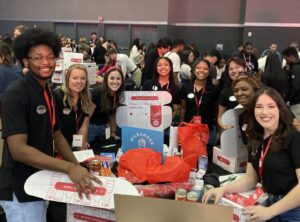In recognition of National Inclusion Week (26th September – 2nd October), we asked Diversity & Inclusion Specialist Joanne Lockwood, who also promotes transgender awareness to organisations, about what the right and wrong questions are to ask a transgender person and why we feel we can ask almost anything.
This includes intrusive questions we often ask to marginalised groups, including the transgender community, and how we can do better.
What toilets do you use? Have you had a sex change operation? Are you gay? What is your real name? Do you take hormones? What did your family think? When did you know? Why are there more transgender people now? These are the questions people ask me all of the time under the guise of trying to understand who I am but that isn’t the same as accepting or supporting me. Can you imagine a cisgender person being asked equally intimate/intrusive questions?
Consider what are the right and wrong questions to ask a transgender person
People in the trans communities may well have suffered years of imposter syndrome, anxiety, dysphoria, microaggressions, bullying and being excluded so making them feel included for their talents, rich diversity and experience is vital in this day and age. Most of us know that using the right pronouns and language and not mis-gendering someone is an important part of inclusion and whilst I personally welcome curiosity and openness, it is important to consider what questions should and should not be asked of people in the trans community.
Examples of wrong questions not to be asked a transgender person
- Don’t ask us questions about our gender pre-transition. It can trigger dysphoria.
- Don’t ask about our medical transition and what operations we have or have not had, nor what medications we may or may not be taking.
- Don’t ask about our genitalia pre and post-transition. It’s creepy.
Examples of the right kind of questions to ask a transgender person
- What pronouns do you use?
- Would you like what you have just shared with me to remain confidential?
- How can I best support you?
Points to note
- Our ‘real’ gender is not the gender we were thought to be when we were born, but who we identify as.
- Transgender men are men, not masculine women and transgender women are women, not feminine men.
- Being transgender is not new or a phase. People whose gender does not match their body at birth have been documented across many cultures for thousands of years. The difference today is that some transgender people feel increasingly safe to be open about who they are and have the option of not having to live with secrecy, imposter syndrome and shame.
- Transgender people are gay, lesbian, bisexual, straight, asexual, pansexual, and every other sexual orientation.
- A gay transgender man was assumed to be female when he was born and is attracted to other men. A straight transgender woman was considered to be male when she was born and is attracted to men.
- We all perform basic bodily functions in a bathroom, but bathrooms are often a place where transgender people can feel unsafe or uncomfortable which is why single-user or gender-neutral bathrooms are often ideal.
- Gender roles and expectations are a social construct, gender identity is not, it is innate.
What to consider on a personal level for inclusion best practice?
- Am I making assumptions about someone’s gender?
- Even if I am curious, is it my business and how are my questions going to make that person feel?
Am I making the other person feel comfortable in the conversation?
- How can I make this person feel included at work and socially?
- Don’t share confidential information or out someone.
- Using the right pronouns is non-negotiable.
You might also enjoy reading from Joanne Lockwood on how to support transgender people in the workplace















